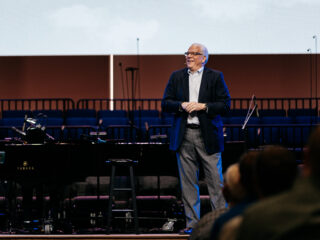Pastors talk to each other. Sometimes, we talk about community events or how our churches can join together to respond to certain needs in our neighborhoods. Recently, as you might guess, we’ve been spending a lot of time talking to each other COVID-19, who has it, and who doesn’t. Who is wearing masks and who isn’t. Who is holding in-person worship services and who is still broadcasting their services online. Which one of us got the most interesting email or phone call from an irate member who was either accusing us of trying to kill everyone and ignoring the science or calling us cowards for closing our services during the pandemic.
For those of us in local church ministry, it’s just another day in office.
Recently, our pastoral conversations have focused on another topic — the frustrating state of student ministry in the local church. No one knows anyone who is doing a good job in discipling students. Every church, it seems, is looking for a good youth minister who can turn around a struggling youth program. Finding a quality youth minister is the challenge of almost every church I know. Parents demand the pastor do something so their students will want to come to church. Parents will give anything — except their time –to ensure their children have a quality experience. No one seems to be able to solve this problem.
According to the experts, there are several reasons for this problem. First, all of the good student ministers are now church planters. Young ministers, unwilling to do the time required to climb the ecclesiastical job ladder, are foregoing the traditional route of serving as a student minister and working their way up to becoming a pastor. They will become a pastor by simply announcing they are starting a church in the nearest school or warehouse. The second thing the experts point out is with the new social demands on our students, student ministry hasn’t adapted to keep up with the new challenges of the modern student’s life.
There are a lot of articles and books written on how we need to change or rearrange our efforts to reach more young people. Most of these ideas and suggestions are nothing more than rearranging deck chairs on the Titanic.
I’m old and crotchety, but I’ve seen a lot of things. After years and years of watching student ministries rise and fall based on the personalities of the student minister at that particular time, I have another theory about why we’re so bad at ministering to our students and their families.
We’re doing it wrong.
I realize that’s a bold statement, but if you disagree with me, the pressure is on you to prove me wrong. See, I have received stacks and stacks of studies by psychologists, professional educators, social scientists, and family counselors who have sounded multiple alarms trying to get us to focus on how poorly our students are doing.
The recent pandemic forced school closures and students lost their communities. For all of the promises of social media, people still need to be together physically. The inability to attend ball games, go on dates, go to the prom, and enjoy the other rites of passage of adolescence did untold damage to our students. Educators are now admitting online school was an abysmal failure. A recent report concluded current students lost millions of dollars of future income become of these lost years of their education.
Addiction is up. Suicides have increased as have suicide attempts. Mental health experts are overwhelmed.
Now, add to that the recent studies which noted the vast numbers of students who are walking away from Christianity and you can begin to see the size of the iceberg we’re headed for. Okay, we’ve already hit it.
What do I mean when I say we’re doing it wrong? For too long, we’ve based our student ministry on an entertainment model. A successful youth minister is the one who can get the most students to the amusement park, beach trip, or mission trip. Weekly student events will have loud music, laser lights, and pizza. Our students have a great time, but learn nothing of who they are in Christ, or who Christ calls them to be, or for that matter, who Christ is in the first place.
When our students graduate high school and enter the adult world, they are crushed under the relentless secularism of the world around them.
How do we change this? How do we do the ministry better?
First, we have to understand student ministry doesn’t begin when the student starts 6th grade. Student ministry begins when the student is born. Parents must understand they, not the student minister, are the primary disciple ministers of their children. The church can’t undo in a few hours a week what parents do 24/7 at home. Growing deep and mature adult disciples of Christ takes the whole church. Everyone has to be committed to raising a 2:52 child. You know, Luke 2:52: “Jesus grew in wisdom and stature and in favor with God and man.”
Most of our parents think they are raising D-1 athletes. They take their students on travel ball trips and pay for expensive summer camps. Sadly, none of this helps our children grow up into the young men and women God calls us to be. The only thing these traveling teams and countless camps do is wear out everybody.
Students are different these days. They can handle more and they can handle it at an earlier age. For instance, if we aren’t talking to our students about sex, we may be too late. The first time the average boy sees porn is about 11 years old. They need mentors and teachers who will patiently explain the deep things of God and explain the beauty of a Christ-centered life in a way they can see and understand. Get them involved in ministry. They can tutor in the nearby elementary school. They can do a reading club at the inner-city library. They can feed the hungry and go on mission trips with adults. After all, most discipleship is caught, not taught.
We need to change our focus to preparing citizens of the kingdom of God, not merely training good employees for the nearest corporation. The goal isn’t a good job or career. The goal is a fully formed follower of Christ. Who will help them discover their identity in Christ? Parents, yes, but more likely, the whole church around the student. The whole church has to understand we are raising adults for the kingdom of God.
Young people aren’t the problem. The world they live in is…and they are drowning. We don’t need a really sharp youth minister who will attract more students. We need a local church with a passion for its children and the adults they are becoming.









